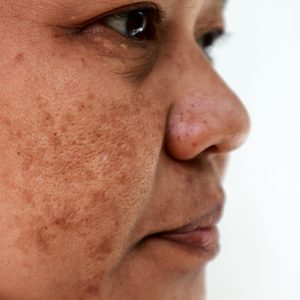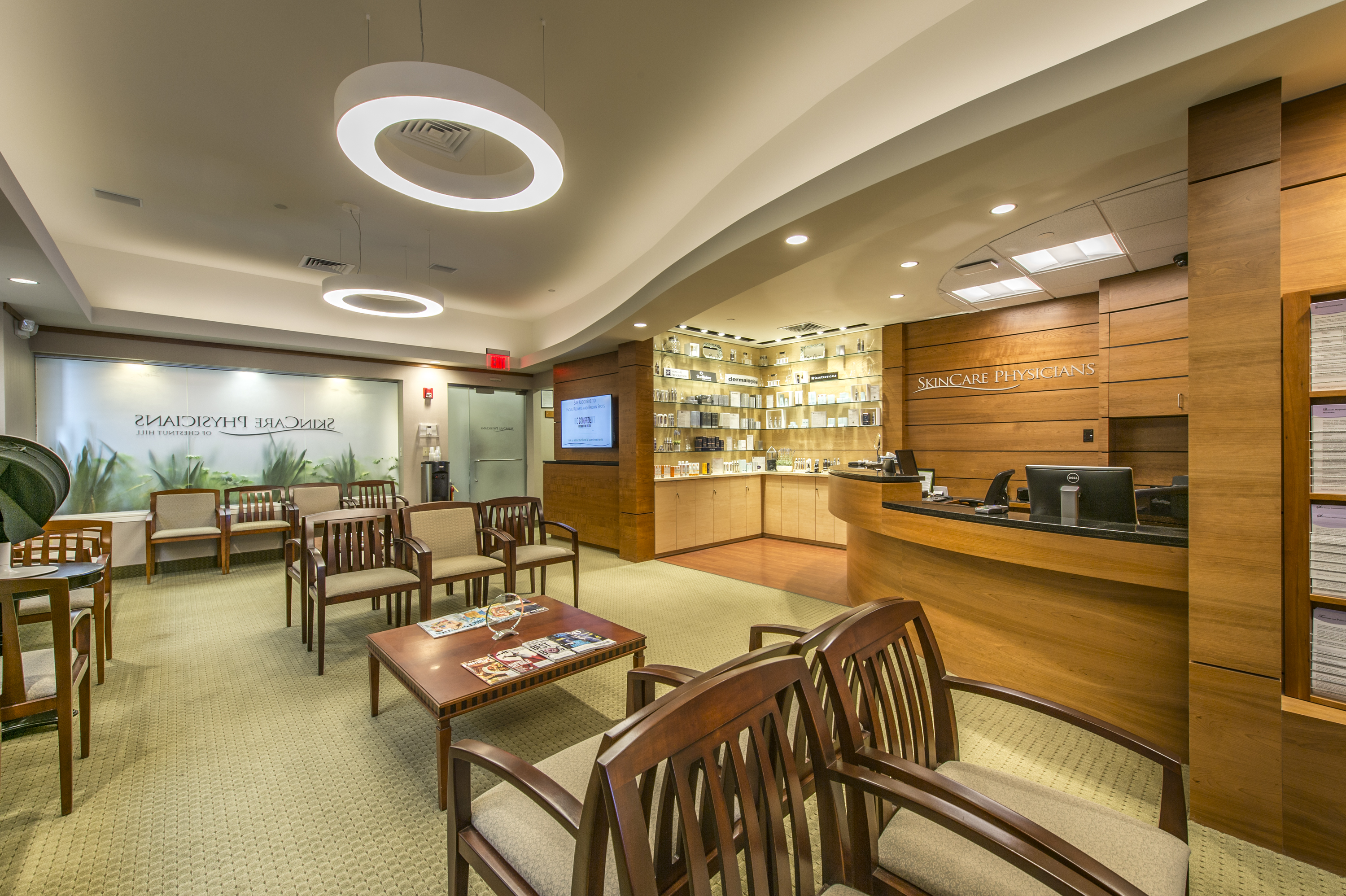- Home
- Blog
- Cosmetic Dermatology
- An update on melasma – controlling a frustrating condition
An update on melasma – controlling a frustrating condition
 Melasma. You know it when you see it: those irregularly shaped brown patches on the cheeks that inevitably darken during the summer months and fade away in the winter. This can be a very challenging and distressful condition, because there is no cure to date. Fortunately, our board-certified dermatologists at SkinCare Physicians have developed an approach that allows us to control melasma even if we cannot cure it. Dr. Mitalee Christman, who has conducted extensive research* on the topic, is unmasking for you the cause of melasma, how we diagnose it and our treatment plans.
Melasma. You know it when you see it: those irregularly shaped brown patches on the cheeks that inevitably darken during the summer months and fade away in the winter. This can be a very challenging and distressful condition, because there is no cure to date. Fortunately, our board-certified dermatologists at SkinCare Physicians have developed an approach that allows us to control melasma even if we cannot cure it. Dr. Mitalee Christman, who has conducted extensive research* on the topic, is unmasking for you the cause of melasma, how we diagnose it and our treatment plans.
Understanding and diagnosing melasma
We know that melasma tends to impact women with deeper skin tones, but men can also be affected. Female hormones, sun exposure, and heat all tend to flare the condition.
A trained eye is essential to distinguish melasma from other skin conditions that can cause dark patches on the face, such as lentigines or post-inflammatory hyperpigmentation. The pigment in melasma tends to form lacy irregular borders, favoring the cheeks, forehead and upper lip. Occasionally, we see it off the face too. During your visit at SkinCare Physicians, we may use a special light called a Wood’s Lamp to determine the depth of the melasma, which will then inform your treatment options. We will also obtain standardized clinical photographs at each visit to track response to each treatment.
The best results to expect
Unfortunately, melasma is a chronic condition and has no known cure to date. By its very nature, it tends to recur, which can be very frustrating. Some treatments work better than others, so we expect the condition to wax and wane. The goal of our treatment plans is to help the melasma change gently and infrequently, rather than oscillate dramatically. I tell my patients they will know their condition is under control when they find they are wearing less make up over time.
A rotation of melasma treatments
All treatments have side effects that prevent long term use, so we often employ a rotation of treatments to control the melasma while minimizing the risk of side effects. This means patients come in to clinic three times a year for evaluation and switching their treatment.
Topical medications:
We will often prescribe hydroquinone, a potent depigmenting agent, sometimes in combination with other ingredients like retinoids, corticosteroids or kojic acid, to a local compounding pharmacy. These compounds help reduce melanin production and fade the dark patches over time. Importantly, hydroquinone cannot be used for more than 8 to 12 weeks, so it is always used in rotation with other treatments.
Oral tranexamic acid pills:
For moderate or severe melasma that is very distressing, we may introduce the idea of taking tranexamic acid pills for a few months a year. This medication is usually used to treat heavy menstrual bleeding, but is increasingly used off-label to treat melasma with impressive results. We believe it works by targeting vascular factors within the melasma-affected skin. The pills are very well tolerated with the most common side effects being bloating, headaches, and lighter periods. There is an extremely rare risk of blood clots, so the medication is only offered after thorough questioning to those deemed low risk.
Chemical peels:
Our aestheticians at SkinCare Aesthetics can employ chemical peels containing alpha hydroxy acids (AHAs), such as glycolic or lactic acid, to exfoliate the skin gently. Chemical peels help lighten melasma patches and promote the growth of new, evenly pigmented skin. They may be repeated every 2-4 weeks for best results.
Laser therapy:
Unfortunately, lasers are not the magic wand many desire for this condition: even gentle lasers can heat the skin and trigger a melasma flare, so we are very cautious recommending them. Some physicians only offer laser once the patient has been followed clinically for many months – this time helps us understand how irritable or pliable the melasma is. Once the melasma is well controlled, and if the patient’s skin stands to benefit from the collagen stimulation capabilities of our lasers, we may propose a low energy, low density, nonablative fractional laser treatment called “Fraxel Quick Recovery” or FQR, often in combination with topical treatments and oral tranexamic acid pills. The temporary improvement provided with this approach can be very satisfying.
Strict sun protection:
Even the best treatment regimen can be undone with sloppy sun care. All year round, but especially in the sunnier months, we recommend wearing wide brimmed hats, UPF clothing, and a tinted broad-spectrum sunscreen with SPF 50. The tint is important because the iron oxides in tinted products block visible light, which we know worsens melasma. The Weather app on your phone can help you identify peak hours (UV index > 3), and during these hours, it is wise to seek shade and limit sun exposure. A Polypodium leucotomos dietary supplement (such as Heliocare) and a UV face shield (such as Bluestone Sunshields) can be helpful adjuncts on tropical vacations or beach days.
Dealing with melasma can be challenging, but our team at SkinCare Physicians is ready to help patients regain their confidence. By accurately diagnosing this condition and utilizing evidence-based treatments, we can turn melasma from a significant mental burden into a minor annoyance easily managed. If you think you have melasma, contact us to schedule a consultation. We look forward to seeing you in clinic.
References
- Del Rosario E, Florez-Pollack S, Zapata L Jr, et al. Randomized, placebo-controlled, double-blind study of oral tranexamic acid in the treatment of moderate-to-severe melasma. J Am Acad Dermatol. 2018;78(2):363-369. doi:10.1016/j.jaad.2017.09.053
- * Kamal K, Heitmiller K, Christman M. Lasers, lights, and compounds for melasma in aesthetics. Clin Dermatol. 2022;40(3):249-255. doi:10.1016/j.clindermatol.2021.11.006
- * Pomerantz H, Christman MP, Bloom BS, et al. Dynamic Optical Coherence Tomography of Cutaneous Blood Vessels in Melasma and Vessel Response to Oral Tranexamic Acid. Lasers Surg Med. 2021;53(6):861-864. doi:10.1002/lsm.23345
- Relke N, Chornenki NLJ, Sholzberg M. Tranexamic acid evidence and controversies: An illustrated review. Res Pract Thromb



Leave a Reply